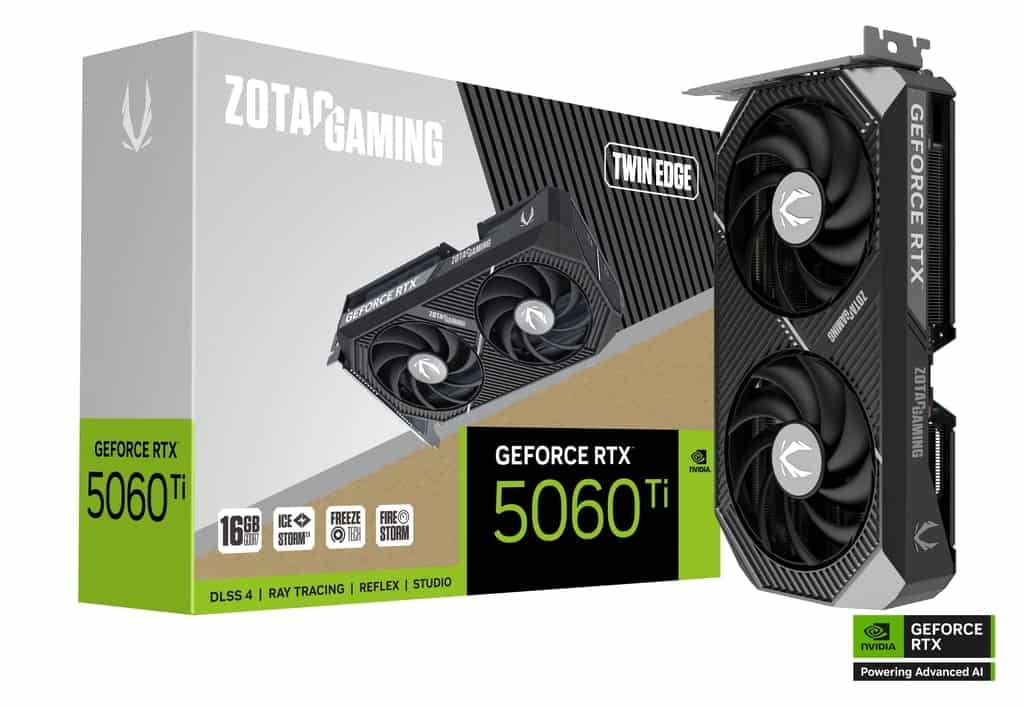With the official release of the NVIDIA GeForce RTX 5060 Ti in April 2025, many gamers are asking the big question: how does it compare to the RTX 4060 Ti, and is the upgrade really worth it? The answer, as always, depends on what kind of gamer you are, what games you play, and how future-proof you want your setup to be.
Let’s dive into the key differences, performance benchmarks, and use-case scenarios to help you decide whether it’s time to upgrade or stick with what you’ve got.
🆕 What’s New with the RTX 5060 Ti?
The RTX 5060 Ti brings several important upgrades over the 4060 Ti, most notably:
- A shift to Blackwell architecture
- DLSS 4 with Multi Frame Generation
- GDDR7 memory (8GB and 16GB options)
- Enhanced ray tracing and AI performance
- Improved power efficiency thanks to architectural improvements
This card is designed primarily for 1080p and light 1440p gaming with modern titles, but the addition of DLSS 4 tech means it punches well above its weight in supported games.
RTX 5060 Ti vs 4060 Ti: Full Comparison Table
| Feature | RTX 4060 Ti (2023) | RTX 5060 Ti (2025) |
|---|---|---|
| Architecture | Ada Lovelace | Blackwell |
| CUDA Cores | 4,352 | 4,608 |
| Base Clock | 2.31 GHz | 2.4 GHz |
| Boost Clock | 2.54 GHz | 2.57 GHz |
| Memory | 8GB / 16GB GDDR6 | 8GB / 16GB GDDR7 |
| Memory Bus | 128-bit | 128-bit |
| Ray Tracing Cores | 3rd Gen | 4th Gen |
| DLSS Support | DLSS 3 | DLSS 4 w/ Multi Frame Gen |
| PCIe Interface | Gen 4 | Gen 5 |
| Power Consumption (TDP) | 165W | 180W |
| MSRP | $399 (8GB), $449 (16GB) | $379 (8GB), $429 (16GB) |
| Performance @ 1440p | Baseline | ~15–25% faster |
Real-World Gaming Performance
Across recent testing in popular titles, here’s what the 5060 Ti delivers over the 4060 Ti:
- Cyberpunk 2077 (Ray Tracing Ultra + DLSS): 20–30% uplift with DLSS 4 enabled.
- Alan Wake II: DLSS 4 frame gen adds major improvements, with smoother frame pacing.
- Call of Duty: Warzone: 5060 Ti edges out higher FPS at 1440p, even with Ultra settings.
- Baldur’s Gate 3: Both cards perform well, but the 16GB VRAM of the 5060 Ti keeps it future-proofed for mods and texture packs.
Should You Upgrade?
Here’s a breakdown of different upgrade paths:
- From RTX 3060 Ti or older: Yes, the 5060 Ti is a strong upgrade, especially if you play modern titles with ray tracing or plan on using DLSS 4.
- From RTX 4060 Ti (8GB): Maybe—you’ll get faster performance and newer features, but it may not be worth it unless you’re after the 16GB version.
- Building a new PC: The RTX 5060 Ti 16GB is a strong, reasonably priced option for future-proof gaming without stepping into enthusiast-level pricing.
The Bottom Line
The RTX 5060 Ti isn’t a revolutionary leap, but it is a smart evolution. It offers better performance, more memory, and cutting-edge features like DLSS 4 that genuinely impact gameplay in supported titles. If you’re still running a 20- or 30-series card—or if you’re eyeing a new build—the 5060 Ti is a balanced and forward-looking GPU that deserves serious consideration.
If you’re already on a 4060 Ti, the upgrade may only be worthwhile if you need that extra VRAM or want to take full advantage of DLSS 4. Otherwise, you’re still in good shape for another cycle.
Key Takeaways
- The 5060 Ti is faster and has more memory than the 4060 Ti.
- Buyers should compare prices and availability before deciding.
- The right choice depends on personal needs and PC goals.
RTX 5060 Ti vs RTX 4060 Ti: Performance and Feature Comparison
Nvidia’s GeForce RTX 5060 Ti shows measurable improvements over the RTX 4060 Ti in both architecture and real-world results. These changes affect game performance, graphics features, and memory capabilities in ways users will notice, especially at higher resolutions and with more demanding titles.
Architectural and Hardware Differences
The RTX 5060 Ti introduces Nvidia’s newer architecture, which brings modest but important efficiency and speed gains over the one found in the RTX 4060 Ti. Nvidia increased the number of CUDA cores, improved AI features, and adjusted clock speeds to boost raw performance.
Both cards are available in 8GB and 16GB VRAM models, but the 5060 Ti uses faster GDDR7 memory, while the 4060 Ti sticks with GDDR6. This results in higher memory bandwidth for the 5060 Ti, which helps with data transfer and smooth gameplay.
Other hardware updates include revised ray tracing and tensor cores, which work better with newer software like DLSS 4. The power draw stays in a similar range, meaning users usually do not need to upgrade power supplies.
Gaming Benchmarks and Real-World Performance
In 1440p gaming benchmarks, the RTX 5060 Ti is consistently faster than the 4060 Ti. Most tests show about a 20–25% performance boost, with results sometimes ranging from 13% to 27% depending on the game.
| Model | Avg % Faster Than 4060 Ti | 1080p Games | 1440p Games |
|---|---|---|---|
| RTX 5060 Ti | – | 18–24% | 20–25% |
Benchmarks from 3DMark, TimeSpy, and games like Cyberpunk 2077 confirm these gains. Players often see higher average FPS, especially when graphics settings are pushed. The performance difference becomes more obvious at higher resolutions and with settings like ray tracing enabled.
Ray Tracing and DLSS 4 Capabilities
Both cards support real-time ray tracing, but the RTX 5060 Ti runs it more efficiently. It uses improved ray tracing cores from Nvidia’s latest lineup. This means better frame rates with ray tracing, especially in modern titles.
The introduction of DLSS 4 is a big point for the 5060 Ti. DLSS 4 offers multi-frame generation and advanced AI upscaling. This allows for smoother gameplay at higher settings and resolutions.
Features like frame generation, 4x frame generation, and enhanced AI upscaling give the RTX 5060 Ti an edge in supported games. This includes demanding titles that use DLSS 4, such as Cyberpunk 2077 and other new releases.
VRAM, Memory Bandwidth, and Configurations
Both the RTX 5060 Ti and 4060 Ti come in 8GB and 16GB VRAM models. The 16GB version of the 5060 Ti can handle large textures and open-world environments much better. Modern games that require more VRAM will see less stutter and fewer slowdowns on the 16GB card.
The 5060 Ti’s GDDR7 VRAM delivers higher memory bandwidth than the GDDR6 on the 4060 Ti. This is key for high-resolution gaming and future-proofing. Fast memory improves performance in newer AAA titles, especially with ray tracing and when running games at 1440p and above.
Users who want stable performance at ultra settings or use their PC for creative workloads benefit more from the 16GB RTX 5060 Ti. The card is better equipped for modern PC gaming and upcoming titles that require more memory.
Pricing, Availability, and Market Considerations in 2025
The Nvidia GeForce RTX 5060 Ti and RTX 4060 Ti target mainstream gamers, but their price points and availability will shape how appealing they are. Both cards launched amid changing supply dynamics and strong competition from other brands, including AMD.
Launch Timeline and Official Announcement
Nvidia officially announced the RTX 5060 Ti in early April 2025, with the launch date set for April 16. The RTX 5060, a slightly less powerful model, is scheduled for release in May 2025. These launches follow the pattern Nvidia set in previous years: a staggered release of its mid-range and budget options.
The RTX 4060 Ti launched in 2023, widening consumer choices in the x60 tier. With the new 5060 Ti, Nvidia aims to capture buyers looking for a step up from the previous generation, focusing on more VRAM and a modest performance bump.
Early reviews for the RTX 5060 Ti focus on its performance, VRAM, and pricing changes. The 16GB VRAM configuration addresses complaints directed at the 4060 Ti, which some found limited in memory for newer games and workflows.
MSRP, Retail Pricing, and Value Assessment
The RTX 5060 Ti carries a manufacturer suggested retail price (MSRP) of $430 for the 16GB variant. This price drops slightly below the original 4060 Ti 16GB MSRP, which debuted at $449, but retail prices may still vary. The standard 4060 Ti with 8GB or 16GB remains available around $379 to $429, depending on the vendor and stock.
Price increases over time happened due to tariffs and fluctuating demand, so actual street prices can be higher than Nvidia’s launch MSRPs. Compared to the 4060 Ti, the 5060 Ti offers about 15% more performance on paper. Buyers should consider whether that gain is worth the extra cost, especially since the gap between MSRPs is narrower than in past years.
When evaluating value, it’s smart to compare the RTX 5060 Ti to other cards in the market. High-end options like the RTX 5070 or RTX 5080 remain far more expensive and may be overkill for typical 1080p or 1440p gaming needs.
GPU Market Trends and Competing Alternatives
In 2025, the GPU market faces both new launches and ongoing challenges with supply. Cards like the RTX 5060 Ti and RTX 4060 Ti serve users who want strong performance but can’t justify the cost of flagship models. The $300–$450 price range remains highly competitive.
AMD’s Radeon RX 9070 is a direct rival. Early comparisons show the RX 9070 and RTX 5060 Ti trade wins, especially when paired with CPUs like the Ryzen 7 9800X3D. Price cuts on last-gen RTX 40-series cards, like the RTX 4080 Super, make them attractive to bargain hunters but may still sit above the price window for most buyers.
Availability for both Nvidia and AMD cards has improved compared to shortages seen a few years ago. However, demand spikes after launch dates can still lead to quick sellouts or temporary price jumps. Retailers adjust pricing based on inventory and anticipated interest, so buyers may need to act quickly or wait for restocks and potential price drops.
Frequently Asked Questions
The RTX 5060 Ti brings improved gaming speeds, more Tensor cores, and a slight core boost compared to the RTX 4060 Ti. Early reviews highlight small but important changes in specs and value, especially for gamers and creators.
What are the performance differences between the RTX 5060 Ti and RTX 4060 Ti?
Benchmarks show the RTX 5060 Ti runs games about 13% to 27% faster than the RTX 4060 Ti at 1440p, with most results falling in the 20% to 25% range. This gives users smoother gameplay at higher settings.
The RTX 5060 Ti also handles more demanding tasks better because of its upgraded architecture.
How does the RTX 5060 Ti compare to the RTX 5070 in terms of specifications and value?
The RTX 5070 sits above the 5060 Ti with higher specs, including more CUDA cores and memory. It outperforms the 5060 Ti in benchmarks but usually comes with a noticeably higher price.
For people on a budget, the 5060 Ti often provides better performance for the cost, while the 5070 is best for those seeking extra speed and features.
What improvements have been made in the RTX 5060 Ti over previous models?
The 5060 Ti has about 5% more CUDA cores than the 4060 Ti. However, it holds a much larger upgrade in the number of Tensor cores—about 73% more.
This boost leads to better performance in AI and upscaling tasks. The 5060 Ti also supports new features for improved efficiency and longer-lasting performance.
Is the extra cost of the RTX 5060 Ti justified by its gaming performance gains?
For those upgrading from the 4060 Ti, the performance jump is clearly noticeable but not huge. Users see up to 25% faster frame rates in some games, especially at 1440p.
The price difference remains modest in many regions, so the extra cost may be worth it for people looking for a smoother gaming experience who can sell their old card.
What are professional reviewers saying about the RTX 5060 Ti’s performance in recent benchmarks?
Reviewers find the 5060 Ti delivers decent improvements. Some call the upgrade “solid but not groundbreaking,” with praise for strong 1440p gaming results.
Others criticize the performance jump as underwhelming compared to how much more Tensor hardware it has. Most agree the card runs cooler and more efficiently than the 4060 Ti.
Can the RTX 5060 Ti provide significant benefits for creators or professionals compared to the RTX 4060 Ti?
The increased Tensor core count helps in rendering, AI processing, and content creation work.
For video editors or 3D artists, the 5060 Ti’s enhancements offer real speed boosts in supported tools. Anyone working on GPU-heavy projects could see shorter render times and smoother workflows.






